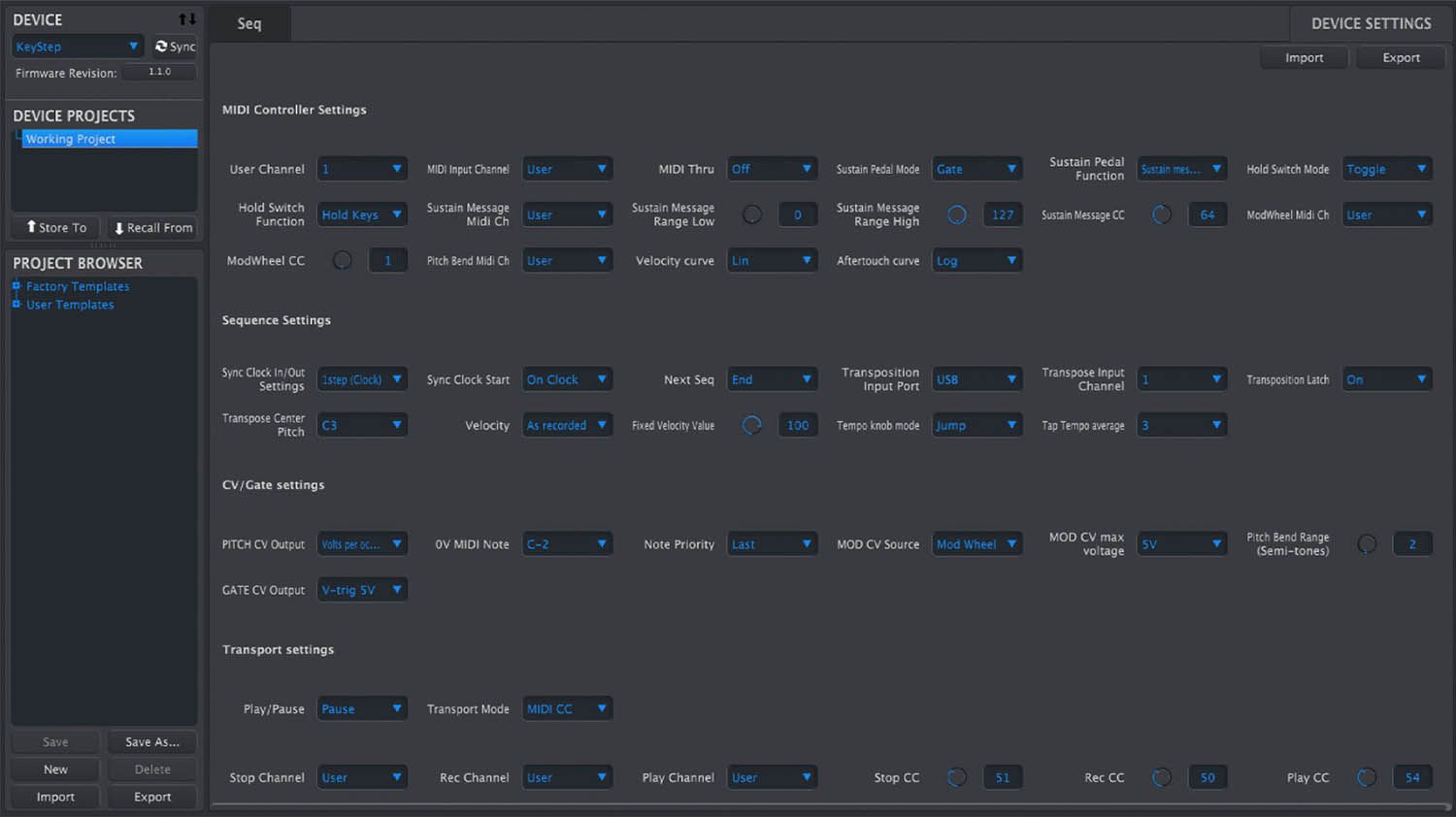One objective
meeting yours
Sometimes, simplicity is the key to efficiency and the best way to materialize an idea into a sonic result.
The design of the KeyStep is based entirely on this vision. Going straight to the point, skating over the constraints and letting musicians focus on their art are KeyStep’s ambitions. Whether your setup is analog or digital, KeyStep will allow you to reach a whole new level of control and creativity.
Firmware
update 1.1
The firmware of KeyStep was given a major update. Version 1.1 unlocks some great new creative possibilities. What’s new ?
- Download the updated manual for step-by-step instructions on the new features.
- Update for free using the Arturia MIDI Control Center.
New sequence length controls
Rapidly change your sequence length with new MIDI Channel shortcut controls.
New “Armed” clock behavior
Rapidly change your sequence length with new MIDI Channel shortcut controls.
New sequence length controls
Change the way KeyStep responds when it receives incoming clock signals.
Updated Arpeggiator octave behavior
Using Shift and Oct +/- in the Arpeggiator mode lets you switch octaves on the fly
New randomness options
2 new randomness modes added, Pattern and Brownian, for ultimate creative chaos.
New MIDI Control Center options
Change the LED brightness, and control all the new features with ease.
Connect
Here is a setup example showing the possibilities of this amazing piece of technology
Versatility is key
KeyStep is made to widen the potential of your setup, regardless of what instruments compose it. It is compatible with practically all existing synthesizers, either analog or digital, hardware or software.
CV for Enthusiasts
The three CV outputs send pitch and gate signals along with velocity, aftertouch or mod. ribbon signal to control an analog instrument or module.
Digital & Analog
The MIDI DIN output can be used to control any MIDI hardware instrument while the USB connection allows you to control your plugins and virtual instruments.
Sustain or not sustain...
KeyStep also integrates a socket for a sustain pedal, sync input and output to follow or send a clock signal, and MIDI input to use an external keyboard or use KeyStep as a MIDI to CV converter.

Create
Never before has a portable keyboard controller incorporated this quantity of features.
Having many devices, many plugins and many modules is a pleasure. Nobody makes secret of it. However, few things are more frustrating than accumulating instruments without being fully able to use them. KeyStep allows you to regain control over your instruments.
KeyStep is loaded with features aimed at boosting your creative freedom. A 32-slimkey keybed with velocity and aftertouch, an 8-mode arpeggiator, a polyphonic sequencer with up to 64 steps and 8 simultaneous notes per step.
Perform
KeyStep will give an unprecedented magnitude to your live sessions.
Like its brothers BeatStep and BeatStep Pro, KeyStep is representative of a new breed of portable controller allowing musicians to free themselves from their computer, in particular in live conditions.
KeyStep is all about spontaneity and immediacy, strengthening the link that musicians can experience with their performance and their public. Each feature has been thought out to match live artists hopes and needs including real-time sequence rewriting, smart sequence-swapping function and simultaneous playing/sequencing.
Three modes of
operation
Sequencer
In Sequencer mode you can record, play and transpose a polyphonic sequence with up to 64 steps and 8 simultaneous notes per step. Sequencer mode also allows you to rewrite in real-time your sequence and even to play and sequence simultaneously on two different MIDI channels.
Arpeggiator
The Arpeggiator allows you to play each note of a chord consecutively instead of simultaneously. The eight possible playing directions and the Time Division knob will enable the creation of complex and mazy melodies.
MIDI Controller
KeyStep stands up to most of the bigger keyboard controllers thanks to its prolific array of features including a custom 32-slim-key keybed with velocity and aftertouch, highly reactive pitch and modulation capacitive ribbons and above all the possibility of controlling almost every type of synthesizer by MIDI and CV.
Unlock the secrets
of KeyStep
KeyStep will transform the way you make music right out of the box, but if you want to go one step further in personalizing your setup, you can use the MIDI Control Center.

Edit and customize sequences
If you like to visualize your music, you can inspect and edit every element of the 8 different preset sequence patterns, ready for your set.
Quickly swap templates
If you use your KeyStep in lots of different ways, you can quickly save and load templates to change every setting at the same time.
Tweak its performance
Change velocity curves, alter the behavior of the random mode, what KeyStep does when it detects clock signals, and even dim the LEDs to your taste.
Gallery
Main Features
Arturia’s own Slimkey keybed with velocity and aftertouch
Arpeggiator mode:
- Up, Down, Inclusive, Exclusive, Random, Walk, Pattern and Order
Sequencer mode:
- 8 polyphonic step-sequences with Rest, Tie, and Legato note entry
Rate control and tap tempo:
- REC, PLAY, and STOP buttons for performance control over the sequencer and arpeggiator
Octave controls for keyboard and arpeggiator
Sustain HOLD button
Sustain pedal jack
Chord play mode
SHIFT button selection:
- MIDI channel selection, GATE time, SWING values
DC jack for standalone operation
USB MIDI connects to computers and our MCC editor
MIDI in/out ports
Sync i/o ports:
- Supports 1 pulse per step, 2 PPQ (Korg Volca), 24 PPQ DIN sync, 48 PPQ DIN sync
Sync select switches:
- Internal, USB, MIDI, Clock
CV/GATE outputs:
- CV supports 1Volt per octave, Volt>Hz modes, Gate output 5V or 12V for modern or vintage gear support
- CV Velo/Aftertouch/Modwheel output











